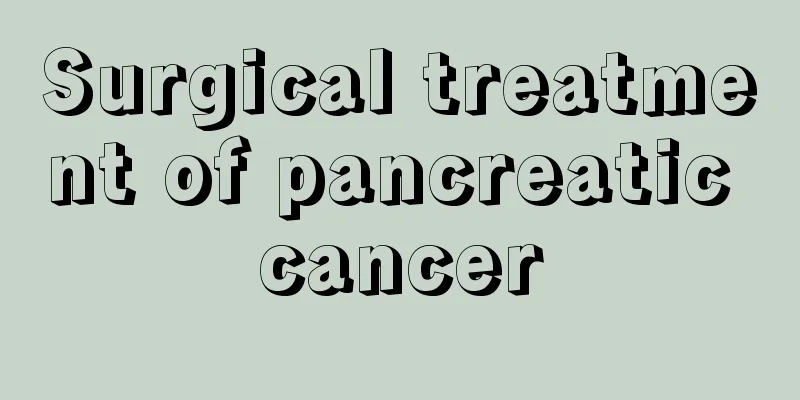Surgical treatment of pancreatic cancer

|
The main treatments for pancreatic cancer include surgery, radiotherapy, chemotherapy and interventional therapy. Relatively speaking, surgical treatment is more effective because it directly removes the lesion and the prognosis is better. There are also three types of surgical treatment for pancreatic cancer, which are described below: 1. Radical treatment Depending on the location of the tumor, it can be roughly divided into pancreaticoduodenectomy, pancreatectomy and total pancreatectomy. Generally speaking, pancreatic surgery is a relatively large operation, which requires high technical level and experience of the surgeon, as well as pre- and post-operative treatment. If possible, it should be performed in a hospital with a large number of pancreatic surgeries. 2. Pancreatic cancer surgery combined with vascular resection In the past, it was believed that tumor invasion of the portal vein and superior mesenteric vein was a contraindication to surgical resection, resulting in a low surgical resection rate. In recent years, with the strengthening of preoperative and postoperative management and the improvement of surgical techniques, this situation is no longer a contraindication to surgical resection, and the goal of complete tumor resection can be achieved through vascular resection and reconstruction. The surgical treatment effect of these patients is the same as that of patients without vascular involvement. 3. Surgical treatment of unresectable pancreatic cancer For patients who are not suitable for radical surgical resection due to tumors or physical reasons, appropriate surgical intervention may have a significant effect on prolonging the patient's survival and improving the quality of life. In this case, common surgical intervention measures include gastrointestinal anastomosis and choledochojejunostomy. It should be emphasized that with the development of medicine, the application of duct stent technology is becoming more and more widespread, and the number of patients who undergo palliative choledochojejunostomy due to biliary obstruction alone has decreased significantly. |
<<: Precautions for liver cancer treatment in the elderly
>>: Delicious medicinal food drives away throat cancer
Recommend
Can abdominal ultrasound detect liver cancer? Generally, it can be detected
Can abdominal color Doppler ultrasound detect liv...
Will glioma cause nosebleeds?
Gliomas usually do not directly cause nosebleeds,...
Is fungal keratitis contagious?
Fungal keratitis is generally not contagious, but...
What is curry
Curry is actually a spice blend that is often use...
Lip makeup removal, 3 major misunderstandings to avoid
Applying lip makeup is something every female fri...
How to use Chinese medicine to treat nasopharyngeal carcinoma
How to use Chinese medicine to treat nasopharynge...
Symptoms and treatment of bile reflux_What are the symptoms of bile reflux
Bile reflux is one of the typical symptoms of sto...
What causes bladder cancer
In recent years, bladder cancer has become one of...
What causes dry cough, no phlegm and itchy throat?
Dry cough is a dry cough and a common clinical sy...
Several common causes of rectal cancer
Rectal cancer is also a type of cancer. Rectal ca...
What is the difference between rotator cuff injury and frozen shoulder
There is a difference between rotator cuff injury...
Will I die if I have my teeth pulled out?
The process of tooth extraction is also quite pai...
What is inside a hard pimple
Acne is a headache for adolescent boys and girls....
How much sleep does a 2 and a half month old baby need?
Sleep is very important for babies. A good sleep ...
The role of rosin
The main function of rosin is to treat women'...









